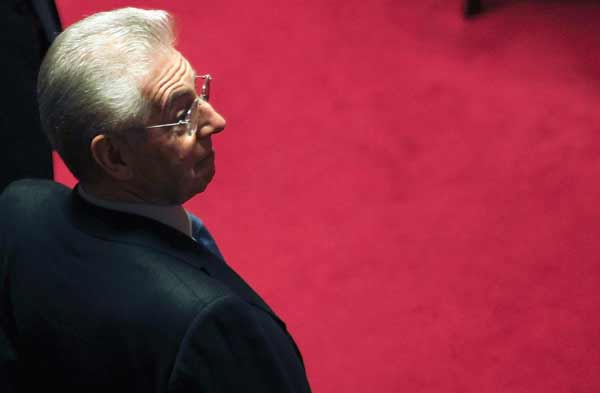Italy Senate passes budget, Berlusconi end nigh
Updated: 2011-11-12 07:26
(Agencies)
|
|||||||||||
 |
|
Former European Commissioner Mario Monti arrives at the Senate in Rome November 11, 2011. [Photo/Agencies] |
ROME - Italy's Senate approved economic reforms intended to reverse a collapse of market confidence on Friday, kicking off a rapid transition that will end the era of Silvio Berlusconi and clear the way for an emergency government within days.
The package of austerity measures demanded by the European Union now goes to the lower house which is expected to approve it on Saturday, triggering the resignation of the prime minister and ending a 17-year era in which he has loomed large over Italy.
The news had an immediate salutary effect on markets.
Italian bond yields, which raced way above sustainable levels earlier this week, fell sharply in response to acceleration of Berlusconi's resignation and the approval of the reforms. The euro also gained.
Former European Commissioner Mario Monti, who is expected to replace the billionaire media magnate by Monday, was applauded when he took his place for the vote after being appointed a Senator for life by President Giorgio Napolitano.
The appointment, transforming Monti from academic to legislator, was seen as clear confirmation that he will be asked to head a largely technocratic government to push through reforms in an effort to head off a perilous crisis.
Global markets panicked earlier this week because of the sustained political turmoil in the euro zone's third largest economy, and Italy's borrowing costs shot above a "red line" of 7 percent -- the level at which Portugal and Ireland had to seek an international bailout.
Deeply alarmed by the crisis, Napolitano banged heads to end the uncertainty and get a functioning government in place within days.
French President Nicolas Sarkozy expressed confidence in a telephone call to Napolitano that a new broad based government would be formed soon capable of overcoming a crisis he said was extremely worrying for all of Europe.
Despite the new optimism, analysts say Monti could face an uphill battle implementing unpopular reforms with strong opposition expected from political groups on both left and right. They said even if he was successful this would not necessarily restore investor confidence in the country.
"Investors are placing too much faith in the formation of a technocratic government...Technocracy should not be seen as a panacea for Italy's ills," said Nicholas Spiro, head of Spiro Sovereign Strategy in London.
European Council President Herman Van Rompuy said in a speech in Italy that implementation of the reforms was crucial but the country would have "real work to do". He said Italy must get on with the reforms, not hold elections.
German president
Christian Wulff, president of EU paymaster Germany, also called Napolitano -- who is effectively running Italy after forcing the pace to end the crisis. They agreed the new measures should be enacted quickly, the president's office said.
A statement by business groups and moderate trade unions on Friday said Italy must have a broad based emergency government by Monday led by an authoritative figure.
"The time for waiting is over," the statement said, adding that whoever failed to support the new government would be guilty of taking the country to a point of no return.
Berlusconi, who lost his majority in a vote on Tuesday, has promised to resign after the financial stability law is passed by both houses of parliament. The delay to his resignation, and talk of a long limbo before elections had unnerved the markets.
Napolitano is thought to want to have Monti's new government in place before markets open on Monday.
Oliver Bailly, spokesman for the European Commission, said the Italian reforms were substantial. "It really does contain many measures which are required to reform and restore the Italian economy and to reassure the markets," he said.
But he said the commission was still waiting for the response to a letter sent to Berlusconi which asked for more details and said additional measures would be needed.
Monti, a respected international economist, has been favoured by markets for weeks to lead Italy out of the crisis.
But although he would be supported by most centrists and the biggest opposition force, the Democratic Party, there is substantial opposition in Berlusconi's existing coalition.
His chief coalition partner, the Northern League, has said it would not back Monti and Berlusconi's PDL party is seriously split. Some analysts say it could implode because of the crisis, with members moving to other parties.











